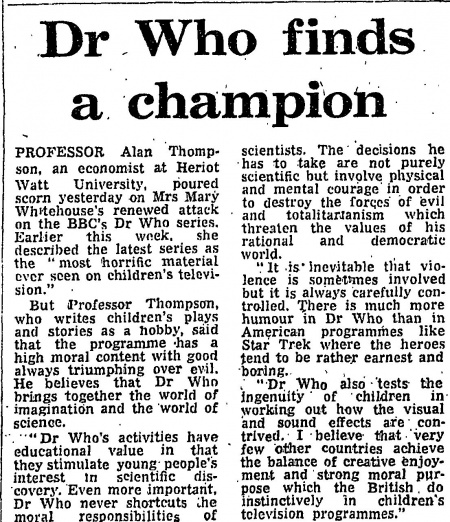Difference between revisions of "Dr Who finds a champion"
John Lavalie (talk | contribs) (Created page with "{{article | publication = The Guardian | file = 1976-01-28 Guardian.jpg | px = 450 | height = | width = | date = 1976-01-28 | author = | pages = 26 | language = English | ...") |
John Lavalie (talk | contribs) |
||
| Line 16: | Line 16: | ||
| moreDates = | | moreDates = | ||
| text = | | text = | ||
| − | PROFESSOR Alan Thompson, an economist at Heriot Watt University, poured scorn yesterday on Mrs Mary Whitehouse's renewed attack on the BBC's Dr Who series. Earlier this week she described [[broadwcast:The | + | PROFESSOR Alan Thompson, an economist at Heriot Watt University, poured scorn yesterday on Mrs Mary Whitehouse's renewed attack on the BBC's Dr Who series. Earlier this week she described [[broadwcast:The Brain of Morbius|the latest series]] as the "most horrific material ever seen on children's television." |
But Professor Thompson, who writes children's plays and stories as a hobby, said that the programme has a high moral content with good always triumphing over evil. He believes that Dr Who brings together the world of imagination and the world of science. | But Professor Thompson, who writes children's plays and stories as a hobby, said that the programme has a high moral content with good always triumphing over evil. He believes that Dr Who brings together the world of imagination and the world of science. | ||
Revision as of 23:39, 18 November 2014
- Publication: The Guardian
- Date: 1976-01-28
- Author:
- Page: 26
- Language: English
PROFESSOR Alan Thompson, an economist at Heriot Watt University, poured scorn yesterday on Mrs Mary Whitehouse's renewed attack on the BBC's Dr Who series. Earlier this week she described the latest series as the "most horrific material ever seen on children's television."
But Professor Thompson, who writes children's plays and stories as a hobby, said that the programme has a high moral content with good always triumphing over evil. He believes that Dr Who brings together the world of imagination and the world of science.
"Dr Who's activities have educational value in that they stimulate young. people's interest In scientific discovery. Even more important, Dr Who never shortcuts the moral responsibilities of scientists. The decisions he has to take are not purely scientific but involve physical and mental courage in order to destroy the forges of evil and totalitarianism which threaten the values of his rational and democratic world.
"It is inevitable that violence is sometimes involved but it is always 'carefully controlled. There is much more humour in Dr Who than in American programmes like Star Trek where the heroes tend to be rather earnest and boring.
"Dr Who also tests the ingenuity of children in working out how the visual and sound effects are contrived. I believe that very few other countries achieve the balance of creative enjoyment and strong moral purpose which the British, do instinctively in children's television programmes."
Disclaimer: These citations are created on-the-fly using primitive parsing techniques. You should double-check all citations. Send feedback to whovian@cuttingsarchive.org
- APA 6th ed.: (1976-01-28). Dr Who finds a champion. The Guardian p. 26.
- MLA 7th ed.: "Dr Who finds a champion." The Guardian [add city] 1976-01-28, 26. Print.
- Chicago 15th ed.: "Dr Who finds a champion." The Guardian, edition, sec., 1976-01-28
- Turabian: "Dr Who finds a champion." The Guardian, 1976-01-28, section, 26 edition.
- Wikipedia (this article): <ref>{{cite news| title=Dr Who finds a champion | url=http://cuttingsarchive.org/index.php/Dr_Who_finds_a_champion | work=The Guardian | pages=26 | date=1976-01-28 | via=Doctor Who Cuttings Archive | accessdate=6 February 2026 }}</ref>
- Wikipedia (this page): <ref>{{cite web | title=Dr Who finds a champion | url=http://cuttingsarchive.org/index.php/Dr_Who_finds_a_champion | work=Doctor Who Cuttings Archive | accessdate=6 February 2026}}</ref>
